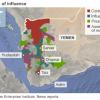
Cartoon Movement)
Farewell to a Palestinian state? Despite his commitment in 2009, in his recent election campaign Benjamin Netanyahu backtracked and pledged that he would never accept a solution to the conflict based on two States. Now, following his electoral victory, a Palestinian State does indeed look unlikely, particularly given Netanyahu’s intention of continuing to promote settlements to split the West Bank and forestall the creation of a single Palestinian territorial unit. With the passage of time such a solution seems increasingly remote, with its substitute being not a single State –especially after Netanyahu’s statements about Arab Israelis, who have united in a joint list for these elections– but managing the current status quo. The Israelis appear to be quite satisfied with their wall and other security measures, although last summer –according to the Dialogue Institute– a majority, although declining, still supported the two-State solution, (and a quarter a bi-national State in which Palestinians would have fewer rights).
Netanyahu’s message has led him to triumph again in an increasingly divided society. Nevertheless, in interviews after his surprise victory he has somewhat qualified his statement to the effect that he has not given up on the two-State solution but that it is not possible right now. He has again mentioned the Palestinian refusal to recognise Israel as a ‘Jewish state’ and the need ‘to have real negotiations with people who are committed to peace’. But he remains non-committal on negotiations. If his government has right-wing leanings, this attitude will become entrenched. If he manages to include Labour’s Isaac Herzog then perhaps he can manage to break Israel’s growing diplomatic isolation.
There has always been something of a falsity in the never-ending peace process that is based on the core two-State solution that the Palestinians, in an epochal mistake, rejected in 1948 (and again failed to embrace in subsequent opportunities). Is the idea now defunct? The paradox is that Netanyahu’s opposition to it comes at a time when the Palestinians are aiming for unilateral statehood, advancing on the diplomatic front in a ‘diplomatic intifada’, as described by Assad Abdul Rahman, a member of the executive committee of the Palestine Liberation Organisation (PLO). This intifada by other means includes taking Israel to the International Criminal Court, a course of action that the Palestinians will probably find it difficult to pursue.
The cause of Palestinian statehood has, nevertheless, recently forged ahead at the UN, at least in its General Assembly –where Palestine is an ‘observer State’– and in some of its subordinate organisations such as UNESCO. Sweden has officially recognised Palestine and the European Parliament supports recognition, while the parliaments of Spain, France and the UK, among others, have urged their governments to do so. That is, as long as it contributes to the peace process.
But the truth is that Europe –given the diversity of opinions and different historical experiences with its Jewish populations– has no idea what to do. It was convinced that the elections would be won by Herzog’s Zionist Union (which is not pacifist), and was in no way prepared for Netanyahu slamming the door on the two-State option. The official conclusions of the latest European Council on 20 March contain nothing about the issue. Was it not talked about? Even the White House seems to have been caught wrong-footed, and the efforts of Secretary of State John Kerry to re-launch a peace process have proved to be futile. But the issue can still take many twists and turns.
Furthermore, the region is now in absolute turmoil, while a new balance of power, even more favourable to Iran (which had already benefitted from the Iraq invasion), appears to be in the offing if the latter manages to reach a nuclear agreement with the US. This is what Netanyahu and many of his voters are most fearful of. But despite his speech in the US Congress criticising Obama, there is not much he can do to de-rail the negotiations, which are now at a decisive phase.
In general it can be said that Israel today weighs less in re-shaping the region, despite being its strongest military and technological power. It has lost friends, including Turkey. Despite Israel’s public discretion concerning the ‘Arab Spring’, it managed to isolate the corrupt National Palestinian Authority from its effects. Furthermore, it was satisfied about the coup that removed Egypt’s democratically-elected Muslim Brotherhood from power, given the latter’s close ties to Hamas.
Israel today is a power that wishes to retain the status quo. It does not want alterations in the Middle East’s frontiers although it would like to see change in certain regimes. It prefers stability, although this might no longer be an option given the turmoil brought about by the emergence of the Islamic State (Daesh) in Iraq and Syria, in addition to other ongoing developments. In any case, it prefers the Sunnis to the Shiites, behind whom it sees the long arm of Iran. It rejects the rapprochement between Iran and the US against Daesh. In fact, according to The Wall Street Journal (in a news item also reported by The Jerusalem Post), Israel has been providing medical aid to fighters from the al-Nusra Front, al-Qaeda’s Syrian branch, who have been wounded in its neighbour’s civil war. If so, Israel is further distancing itself from the Obama Administration, which now sees President Bashar al-Assad as part of the solution to stopping the Syrian civil war and stopping Daesh in its tracks.
Geopolitics makes strange bedfellows. Perhaps everything still needs to get worse before it can start getting better, and this includes the hard-to-resolve issue of Palestine. Outside pressure on the parties involved has never really been exerted, even in the UN, where Israel may no longer count –unless it changes its attitude– on unconditional support from the US. That much has the White House intimated, although Israel can always count on the US military card. Nevertheless, today the Israeli-Palestinian conflict, and Israel itself, have lost their position of centrality in the region and now matter less.


